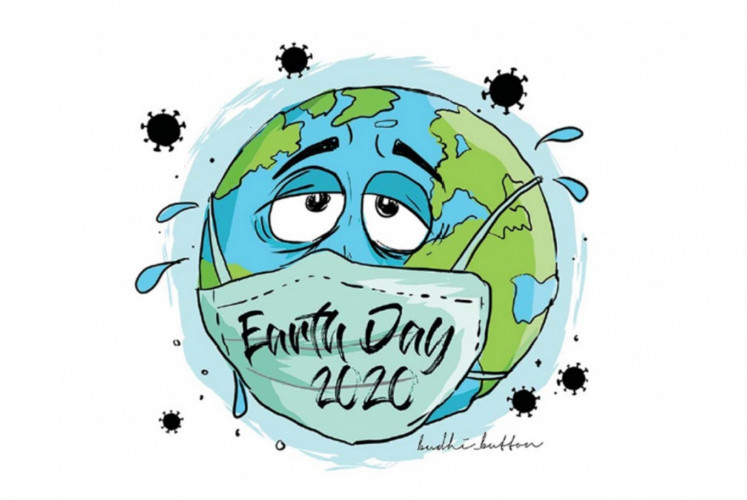Popular Reads
Top Results
Can't find what you're looking for?
View all search resultsPopular Reads
Top Results
Can't find what you're looking for?
View all search resultsOn Earth Day, COVID-19 a ‘wake-up call’ to reinvigorate nature
Change text size
Gift Premium Articles
to Anyone
C
OVID-19 should serve as a wake-up call for Indonesia to better preserve its natural environment, activists say, as scientists have linked environmental degradation to the spread of the zoonotic diseases.
On Wednesday, the Indonesian Forum for the Environment (Walhi) blamed the country’s capitalist economy and the greed of corporations and investors for the environmental damage that they said had caused COVID-19 to “haunt” the Earth.
The group was referring to a 2016 United Nations Environment Program report, which found that the risk of emergent and fast-spreading diseases increased as encroachment upon natural habitats by mankind intensified. The proximity enabled pathogens found in wild areas to spill over into livestock and humans.
Read also: Humans to blame for spread of coronavirus and other 'zoonosis'
“The mismanagement of our country and of Mother Earth has made us realize that the planet we live on is no longer safe; the Earth is no longer able to sustain the environmental damage of greedy investments,” Walhi wrote in a statement on Earth Day.
As the global community commemorated the 50th annual Earth Day on Wednesday, COVID-19 continued to cast a pall over most of the world’s countries, dampening the celebrations.
Further research is required to determine all the factors that have caused the pandemic, but so far, much of the scientific world suspects that bats and pangolins have acted as carriers of SARS-CoV-2, said Indonesian Institute of Sciences (LIPI) microbiology researcher Sugiyono Saputra on Tuesday.
SARS-CoV-2 is the coronavirus strain that causes the pneumonia-like disease, which has infected more than 2.4 million people worldwide and killed almost 170,000, according to World Health Organization data on Wednesday.
A cartoon depicting Earth Day 2020. (JP/Budhi Button)The virus is believed to have first emerged in animals sold in a wildlife market in the Chinese city of Wuhan late last year, although newer studies have cast doubt on this assumption.
Read also: Wuhan's 'wet markets' struggle after virus lockdown
Indonesian researchers have urged the government to implement stronger measures against the cross-border wildlife trade to anticipate the possible spread of COVID-19. Animal rights organizations have also called on the government to close all markets that slaughter or sell illegal wildlife.
A coalition of several animal rights groups wrote in late January that they had visited a “good number” of animal markets where the “conditions are the same as those being described by scientists as the perfect breeding grounds for new and deadly zoonotic viruses”, potentially exposing thousands of people in Indonesia every day to a variety of diseases originating from animals.
Many rural communities across Indonesia still have an appetite for wildlife, such as bats, snakes, wild boar and dogs, putting those who eat them at risk of contracting zoonotic diseases.
Read also: Monitor wildlife trade as certain animals 'have potential' as coronavirus carriers, warns LIPI
The Intergovernmental Science-Policy Platform on Biodiversity and Ecosystem Services (IPBES), a panel of United Nations experts on biodiversity, estimates that zoonotic diseases kill about 700,000 people a year.
The virus that caused the Severe Acute Respiratory Syndrome (SARS) epidemic – which also originated in China and killed about 800 people worldwide in 2002 and 2003 – originated in bats, civets and raccoons. The virus that caused the Middle East Respiratory Syndrome (MERS) outbreak, which killed 282 people in Saudi Arabia in 2014, was transmitted from camels to humans.
Center for International Forestry Research (CIFOR) senior scientist Herry Purnomo urged urban dwellers to refrain from eating the cuisine of rural communities to keep interactions between wild animals and humans at a minimum and prevent such diseases from spreading in the future.
“When we do damage to nature, nature will find a new balance that humans may not like,” Herry said on Wednesday.
He also advised tightening protocols and certifications to ensure food safety in wild animal consumption but warned that illegal markets might thrive if the wildlife trade was banned outright.
UN Secretary General Antonio Guterres said in New York that while the impact of COVID-19 was both “immediate and dreadful, [...] there is another, even deeper emergency: the planet’s unfolding environmental crisis”.
“We must act decisively to protect our planet from both the coronavirus and the existential threat of climate disruption,” he said in a statement circulated on Wednesday.
“The current crisis is an unprecedented wake-up call.”
This diptych demonstrates the side effects of the physical distancing policy on air quality in Jakarta. The first photo (above) shows a view from Central Jakarta on March 11, with a hazy skyline. The second photo (below) shows the Jakarta skyline around Jl. Sudirman on April 3 with much clearer skies. ((above) JP/Dhoni Setiawan/(below) Antara/ Galih Pradipta)The pandemic has not been all bad news for the environment. Factory shutdowns and travel bans have curbed carbon emissions and made the skies clearer in many countries, including Indonesia. However, experts say the cleaner air may be short-lived as economies will likely try to make up for lost time.
Reports of wild animals roaming some of the world’s biggest cities have also emerged as people retreat into their homes and more countries go under lockdown, AFP reported.
Indonesia is still miles away from resolving its environmental and wildlife problems. National Disaster Mitigation Agency (BNPB) data shows that land and forest fires ravaged 942,484 hectares of the country in 2019, almost double the area in 2018 – gutting natural habitats and biodiversity.
Read also: Nature takes back world's empty city streets












